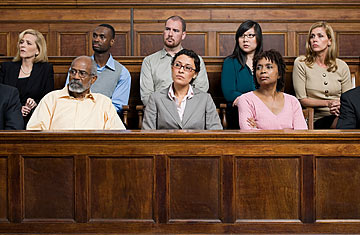
Information regarding Jury Duty
- January 30, 2017
- ckadmin
- No comments
How do I get selected for Jury Duty?
You get selected at total random from the Australian Electoral Role. This essentially means that some people will never get selected, whilst others may get called multiple times. There is no ‘trick’ to get on a jury, it is luck of the draw.
How do I get out of jury duty if I do not want to do it?
You may not be able to simply ‘get out of’ jury duty, however you may apply to the Court or Juries Commissioner to excuse you from Jury Service, this can be granted for up to 3 years. You must provide a ‘good’ reason, which section 8 of the Juries Act 2000 defines as including:
– illness;
– incapacity, such as deafness, illiteracy, mental disability;
– the distance to travel to jury service is—
o if in Melbourne, more than 50 kilometres; or
o if outside Melbourne, more than 60 kilometres;
– travel to jury service takes ‘’excessive time’’ or causes ‘’excessive inconvenience’’;
– substantial hardship will materialise from the person attending jury service;
– substantial financial hardship will materialise from the person attending jury service;
– substantial inconvenience to the public would result from the person attending for jury service;
– the person has the care of dependants and alternative care is not reasonably available i.e. a mother and children who cannot afford day care, elderly carer;
– the advanced age of the person;
– the person is a practising member of a religious society or order the beliefs or principles of which are incompatible with jury service;
– any other matter of special urgency or importance.
Essentially, it cannot simply be that you ‘cannot be bothered’.
What is the process when I attend Jury Duty?
When you attend jury duty you are placed into a large room with many people. At this time, if you have any reasons as to why you cannot do jury duty that have not already been flagged, you should speak to someone. Eventually you enter a Court Room and will be called by your first name and occupation and be directed to walk past the parties and step towards the Jury stand. Both parties have until you sit on the seat to ‘challenge’ you. This means have you off the Jury. In a standard trial with one defendant and one prosecutor, challenges without any reason at all can be made 6 times per party.
If the defendant or prosecution sees someone they know (note: this does not have to be a significant relationship, it could be that they served you fish and chips growing up as a child) they have an unlimited number of ‘for cause’ challenges, which are used to excuse a person from Jury service where they are known to the parties and possible bias or prejudice could result.
I have a criminal conviction and have been called for Jury Duty. Can I accept?
This depends on a number of factors. Schedule 1, section 5(2) of the Juries Act 2000 states as follows:
– Criminal conviction, no sanction: If you simply have a criminal conviction (no sanctions of imprisonment or community based orders) within the last 2 years you may be disqualified.
– Criminal conviction with suspended or small sanction: If you have been imprisoned for less than 3 months or sentenced to a suspended sentence (wholly or via a community based order) within the last 5, you will likely be disqualified.
– Criminal conviction with large sanction: if you have been sentenced to more than 3 years imprisonment within the last 10 years, you will likely be disqualified.
– If you have been charged with a criminal offence and are on bail or remand you will be disqualified.
– If you have been declared bankrupt without a discharge you will be disqualified.
Once these time limits have surpassed, you are free to attend Jury duty once again.
Can ex-judges, police officers and lawyers be called for Jury Duty?
This is also a question of degree and time. If the person called has been any of the following within the last 10 years they will be ineligible for jury service:
– A Bail justice
– A judge, magistrate, registrar or holder of any other judicial office
– Any person admitted to legal practice in Victoria
– A person whose job is connected to the investigation o offences or the administration of justice / punishment of offences (i.e. a prison officer)
– A member of the police force;
There are a number of other public servants and political entities who are ineligible to prevent any prejudice occurring. These are listed in Schedule 2, section 5(3) Juries Act 2000.

Leave a Comment